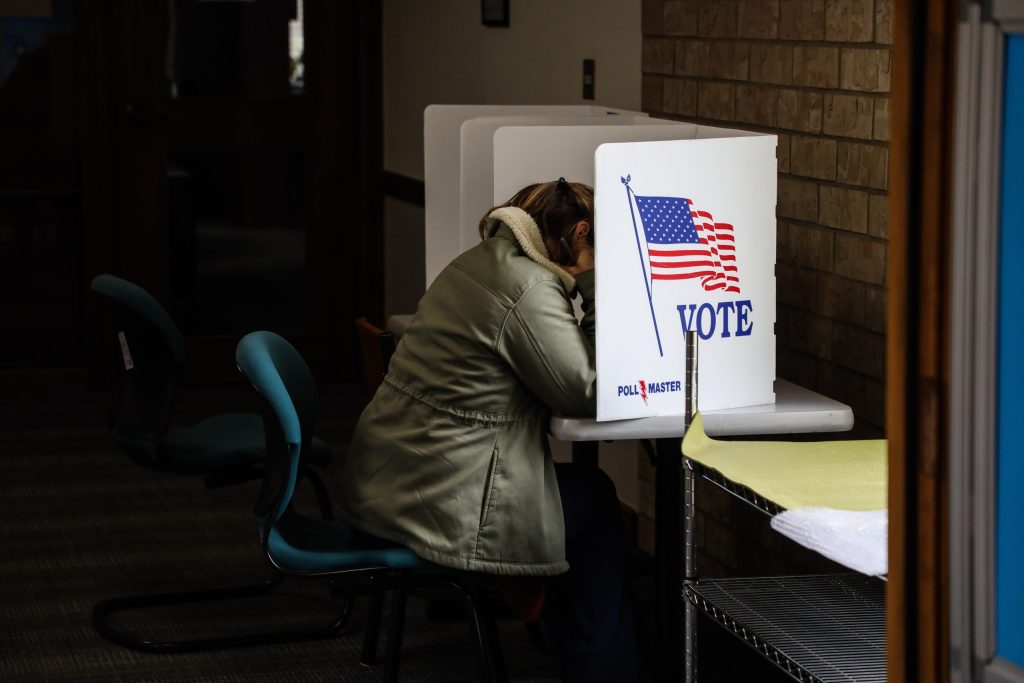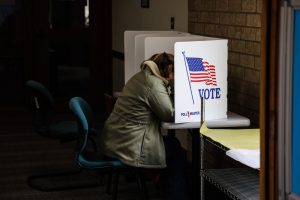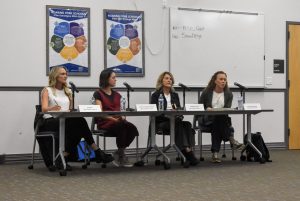Republicans are losing support from Latinos in Colorado as voters voice dissatisfaction with immigration, inflation efforts
Roughly 13% of Colorado Latinos who voted for Trump in 2024 said they would not vote for him in a do-over, citing frustration over the administration's lack of attention to the economy

Chris Dillmann/Vail Daily
Trump’s Latino support is bleeding. Economic security and immigration enforcement top the list of concerns for Latino voters in Colorado, as many express their voting priorities have either gone unaddressed or worsened since the 2024 presidential election.
The Colorado Latino Agenda — co-led by Voces Unidas de las Montañas and the Colorado Organization for Latina Opportunity and Reproductive Rights — and UnidosUS released poll findings on Nov. 6 revealing where Colorado Latino voters stand one year ahead of the 2026 mid-term elections.
The poll, conducted by BSP Research, surveyed 400 Latino voters in Colorado as part of a larger national poll of 3,000 Latino voters called the “Bipartisan Poll of Hispanic Voters: The Road to 2026,” which offers a nuanced look at Latino voter sentiment. BSP Research is a Latino-owned polling, research and analytics firm headquartered in California.
Latino voters who participated in the survey were clear with their dissatisfaction: 72% believe the country is headed in the wrong direction, and their vote in 2026 will likely reflect this sentiment.
“Colorado is going to play an important role of whether the House and the Senate flip or stay under GOP control in 2026 and beyond,” Alex Sanchez, president and CEO of Glenwood Springs-based Voces Unidas de las Montañas, said in a Thursday press briefing of the poll results. “Latino voters are tired. We are frustrated, and we are done waiting for Washington to work.”
Among the 35% of all Colorado Latinos who voted for Trump in 2024, 13% said they would not vote for him in a do-over and 7% said they don’t know, compared to less than 1% of Harris voters who would not vote for her again. Respondents cited frustration with the administration’s lack of attention to economic issues and unpopular approach to immigration enforcement.
“A 20% bleed for Trump voters should be very concerning to GOP political operatives,” said Gary Segura, Principal and Co-owner of pollster BSP Research.
In response to Trump’s actions over the past year, an overwhelming 81% of Hispanic voters in Colorado cited concerns that Congress is not exercising its checks-and-balances role and giving up too much authority to the president, including 49% of Republican respondents.
Immigration, cost of living top issues for Latino voters
Latino voters pointed to three major issues driving their waning perception of Trump: immigration arrests and deportations, the cost of living and inflation, and cuts to Medicaid and food assistance programs like SNAP, which the government stopped funding on Nov. 1 amid the country’s longest federal government shutdown.
“Voters see an administration that has time for political stunts and immigration crackdowns but not for policies that actually make life more affordable or fair,” Sanchez said. “Latino voters are angry, and rightfully so.”
Segura said immigration is a bigger factor in Colorado’s attitudes toward the president than it is in other states, where the focus is heavier on the cost of living and jobs in the economy. One explanation for this heightened concern over immigration policies, Sanchez said, is that almost half of Latino registered voters in Colorado have someone in their immediate family who may be undocumented or be in danger of being targeted by the administration.
“I believe that probably connects the dots as to why immigration has always been personal to so many of us here in Colorado,” he said. “President Trump used Aurora as a platform (for) his hate and his policy approach. We’ve seen probably more than 400 individuals (detained) from our communities here in Colorado.”
When asked to rank U.S. immigration policies elected officials should pursue, Latino voters showed support for “providing path to citizenship for law-abiding undocumented individuals,” specifically those who were either brought to the country as children or have “been in the U.S. for a long time.”
Most Colorado Latinos, 71%, also strongly disagree with the Supreme Court ruling allowing ICE agents to arrest people on suspicion of immigration violations based solely on appearance, Spanish-speaking and participating in manual work, since this puts Latino citizens and legal residents at risk of being detained.
Colorado Latinos are frustrated, too, with the Trump administration’s lack of attention on the economy. Nearly 70% said they think the president and Republicans in Congress are not focusing enough on improving the economy, one of the administration’s loudest campaign promises leading up to the 2024 election.
Of Latino voters who responded to the survey, 86% said their personal economic situation has either remained the same or worsened since last year, and 54% said they think Trump’s policies will worsen their economic outlook by next year.
“Latino families are doing everything right. We’re working multiple jobs, we’re caring for our loved ones, we’re contributing to every part of the state’s economy,” Sanchez said. “Yet, we’re falling further behind. What we see is a Washington that is in dysfunction. We see cruelty in misplaced priorities.”
A growing voting power for Colorado Latinos
Today’s voter sentiments from Colorado Latinos are expected to have major implications on the results of the 2026 midterm elections. Roughly 19% of Colorado Latinos voted for the first time in 2024, and 74% of total registered respondents said they are certain or likely to vote in 2026, the majority of which are registered Democrats.
“Latinos are now the second largest voting age population in the U.S., yet there continue to be a lot of misconceptions and mistaken assumptions about these voters,” said Clarissa Martinez De Castro, UnidosUS Vice President of the Latino Vote Initiative. “The findings from the poll are very clear in this regard. Hispanic voters across the nation feel that their economic situation is precarious, and that now their own government is putting their civil rights and personal safety at risk with its policies and tactics.”
If the 2026 election were tomorrow, 55% of Hispanic voters in Colorado would support Democrats compared to 21% for Republicans. Both parties underperform 2024 support levels, however, which Segura attributes to voter discontent.
“While Democrats, yes, continue to hold an advantage in Colorado, it’s not guaranteed,” Sanchez said. “Latino voters are pragmatic. We reward action, not party labels. We will support whomever delivers real progress on jobs, on housing, on health care, and yes, on immigration reform.”
Consistent with prior years, the top four voter issues ranked by Latinos are all driven by economic concerns, including cost of living and inflation, housing costs, jobs and the economy and healthcare.
When it comes to jobs, the majority of respondents said they wanted to see elected officials address Colorado’s “too low” minimum wage and the reality that many Latinos have to get second jobs to make ends meet. Healthcare challenges were more related to insurance access and affordability than actual quality of care.
“The top message from Hispanic voters in Colorado, and elsewhere, is, ‘Please lower our costs. Please raise our wages,'” Segura said. “Colorado Hispanic families are struggling to make ends meet, and Latino-elected officials should be addressing things like basic living expenses, affordable housing and rising costs.”
Over 60% of Latino voters also expressed concern that civil rights and liberties — including freedom of speech, equal treatment, protection from discrimination and the right to fair trial — have become less secure since Trump took office, including 26% of Republican voters and 58% of independents. Only 20% of voters said they felt their rights have gotten more secure, including 10% of Democrat voters.
Another important distinction: U.S.-born Latinos were more likely to say their rights had gotten more secure since Trump took office compared to naturalized Latinos by almost 10%.
The poll results also showed a notable difference between how men and women responded. Over 70% of Hispanic women said they felt their rights were less secure since Trump took office, compared to only 52% of men. Men are also more likely to vote for Republicans in the 2026 midterm election than women.
- A 61% majority of Hispanic voters said they hold the president and Republicans responsible for the federal government shutdown, compared to the 23% blaming Democrats. More Latino Republicans blame their own party (27%), compared to 12% of Democrats.
- Nearly half of Latino voters in Colorado (32% of Republicans and 60% of Democrats) are concerned they or someone they know will be a victim of political violence. More naturalized Latinos indicated concern than U.S.-born Latinos.
- For the most part, respondents agreed that Democrats would do a better job on issues like healthcare, jobs and employment, election integrity, gun policy and affordability compared to Republicans, though favor was evenly split between Democrats and Republicans on the issue of border security.
- Over half of Latino voters oppose sending the National Guard or active-duty military to U.S. cities for immigration enforcement purposes. 35% said deployments should only happen at the request of state or local leaders, and 33% said they should not happen at all.

Support Local Journalism

Support Local Journalism
Readers around Glenwood Springs and Garfield County make the Post Independent’s work possible. Your financial contribution supports our efforts to deliver quality, locally relevant journalism.
Now more than ever, your support is critical to help us keep our community informed about the evolving coronavirus pandemic and the impact it is having locally. Every contribution, however large or small, will make a difference.
Each donation will be used exclusively for the development and creation of increased news coverage.










